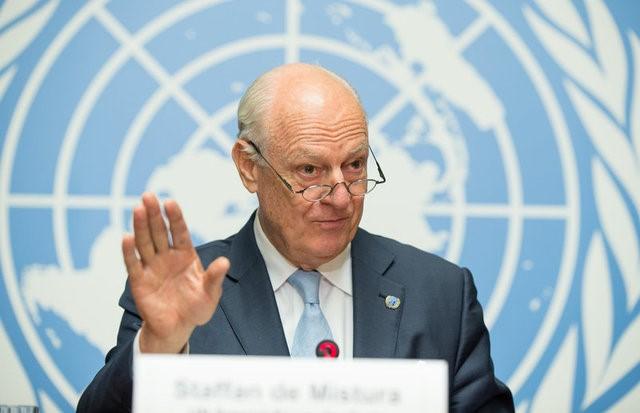The latest round of Geneva talks on Syria’s conflict ended Friday with no notable advance, but a shift in language by UN envoy Staffan de Mistura towards the Assad regime.
De Mistura put the emphasis on “counter-terrorism”, one of the four “baskets” in the discussion and the one upon which the regime wants focus. Bashar al-Assad and his advisors often use “counter-terrorism” to refer to all armed opponents of the regime.
At the same time, De Mistura said little about the other three baskets: a new Constitution, free and fair elections, and a political transition — opposed by Assad if he has to relinquish power.
The UN envoy justified the tilt by saying that the regime delegation had given no indication that it would discuss transition. He said he felt the UN was expected to say where it stood on terrorism, “the main issue being discussed at the highest possible level elsewhere”.
He played down the lack of any apparent advance, especially with the Syrian opposition, by saying there was “no breakthrough” but also “no breakdown and no one walking out”:
What I do believe is that what are going to be the next steps of the international community in wanting to see an acceleration of the end of this conflict may help the government to be ready to address the political process.
De Mistura pushed back his projection for the first direct regime-opposition talks. He said earlier this week that it could be before the next Geneva talks in late August and “even sooner”, but yesterday he said it could come during the next rounds, now pushed back to September.
The opposition High Negotiations Committee finally met de Mistura on Friday but gave no indication that it was setting aside the demand for a political transition, as well as calls for an end to the Assad regime’s attacks and sieges and for the release of political detainees.
The head of the regime delegation, Bashar al-Ja’afari, tried to take advantage of De Mistura’s statement by saying that the issue of “terrorism” should be referred to the Security Council.
Ja’afari then attacked the US and Turkey. He spoke of “massacres” by the American-led coalition supporting the Kurdish-led Syrian Democratic Forces in their offensive against Raqqa, the Islamic State’s center in Syria. Then he declared that “the deterioration of the humanitarian situation” — far from being the outcome of years of attacks and sieges by pro-Assad forces — was also because of “Turkish expansionist intentions in northwestern Syria”.


Trackbacks/Pingbacks